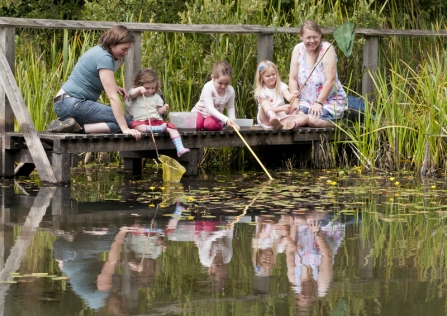
Image by: Ross Hoddinott/2020VISION

Image by: Ross Hoddinott/2020VISION
There is overwhelmingly compelling evidence that being out in nature is good for our mental and physical health. Humans are meant to be ‘a part of nature’, not ‘apart from nature’. And yet, our children are less and less connected to nature and more and more connected to their screens, as any parent who has tried to part their child from their phone will, I am sure, relate to!
There is even a term for this problem ‘nature deficit disorder’. There is a shocking, proven connection between the decline in natural play and the decline in children’s health and wellbeing. A generation ago, 40% of children regularly played in natural areas, compared to only 10% today, with a further 40% never playing outdoors. Obesity, anti-social behaviour, friendlessness and fear are the known consequences.
There are too many signs that nature does not feature in children’s lives. Did you know, for instance, that the Oxford Junior Dictionary has removed words such as conker, bluebell, blackberry, heron, kingfisher, newt and otter from their dictionary, as they are no longer relevant in children’s lives, and replaced them with cut and paste, broadband, blog and chat room? How depressing is that?
But it isn’t just our children’s health that suffers, this will have a huge effect on the health of nature and wildlife both now and into the future - how can we expect children to be the future protectors of wildlife and nature if they’ve not had experience of it themselves? If they have never climbed a tree, waded in a little stream, held a ladybird on their hand?
But the good news is that people are onto it. It’s not just the Wildlife Trusts, but many of our nation’s favourite charities, including RSPB and National Trust, have their own projects and initiatives to get children outside and re-connecting with nature.
More good news is that is it easily within our grasp to turn this situation around. Just five minutes ‘green exercise’ can have a rapid increase in mental wellbeing and self-esteem, with the greatest benefits experienced by the young, according to research by the University of Essex. And nature is free, easily accessible and all around us. You don’t need to visit a nature reserve, it’s a trip to the local park, or if you have a garden, it’s just stepping outside your back door.
So, whilst I am not the first, and certainly won’t be the last, I am adding my voice to this rallying call to action. I ask you to do all you can to re-wild your child, your grand-child, your friend’s child – in fact any child you know! And please start today - encourage them to climb a tree, build a den, get muddy.
Prising children from their screens can be easier said than done, so if you need a little help and inspiration to make this a really wild Easter Holiday then why not:
Together we can make every child wild, and look forward to a healthier future for our children and for nature.